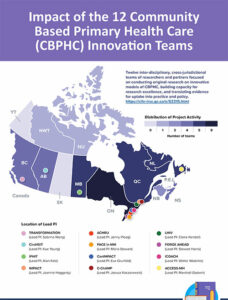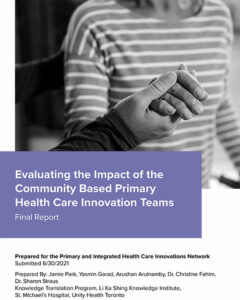Evaluating the Impact of the Community Based Primary Health Care Innovation Teams
This project was commissioned by the Primary and Integrated Health Care Innovations Network (PIHCIN), to assess the individual and aggregate impact of 12 Community Based Primary Health Care (CBPHC) Innovation teams and a CBPHC network funded by the Canadian Institute of Health Research (CIHR). The purpose of the teams was to support research surrounding the delivery of CBPHC. The teams conducted cross-jurisdictional research projects designed to improve access to CBPHC for priority populations and to improve quality of care for chronic disease prevention and management. The CBPHC network was comprised of the 12 teams and involved a series of annual network meetings, cross-team sub-committees, and cross-team publications.
The Team for Implementation, Evaluation and Sustainability (TIES) within the Knowledge Translation Program (KTP) collected data on the impact of the CBPHC Innovation teams and network by conducting qualitative interviews with representatives from each Innovation team, as well as a document review. The activities and impact for each team were then summarized, along with recommendations for future CBPHC research networks.
Findings suggested that the individual and aggregate impact of the CBPHC Innovation teams were wide reaching, with many teams scaling up their interventions to additional areas, sites, and/or communities. Some CBPHC Innovation team projects led to transformational healthcare system policies. Areas where aggregate impact was found included enhancing knowledge, capacity building, partnership building, informed decision making, and broad socioeconomic and health impact. At the network level, impact was found for enhancing knowledge, capacity building and partnership building.
Data collected also helped to inform two sets of recommendations: (1) recommendations for the CBPHC network (e.g., grouping project team objectives) and (2) recommendations on CBPHC network evaluations (e.g., selecting an evaluation framework in the early
stages of the evaluation plan). These suggestions could be used to further improve the implementation and evaluation of future CBPHC research networks.
For more information, please contact Dr. Sharon Straus: strauss@smh.ca
In 2012, the Canadian Institutes of Health Research (CIHR) funded a five-year signature initiative to support research surrounding CBPHC delivery. Since funding ended in 2018, each team had conducted internal evaluations of impact, however there had been no formal, aggregate evaluation of the network, its performance and impact to date.
The PIHCIN, an organization looking to continue the work of the teams, commissioned the KTP to assess the individual and aggregate impact of the 12 CBPHC Innovation teams, as well as the network-level impact.
From January to May 2021, we collected information regarding CBPHC team activities and impact through semi-structured interviews with members from each team and document reviews. We reviewed 277 documents and interviewed 22 participants with at least one representative from each team.
We categorized the team activities using the ‘Knowledge to Action’ (KTA) framework, while the team and network-level impacts were organized using a modified version of the Canadian Academy of Health Sciences (CAHS) Framework.
Collectively, the CBPHC Innovation teams produced 1306 knowledge products; involved 495 trainees, conducted 73 training initiatives, had an effect on 16 policies/guidelines, developed 24 innovations/interventions, spread/scaled innovations/ interventions to 518 communities/regions/sites, and developed over 184 partnerships.
Team members indicated that they were able to achieve their project objectives and that the projects had transformational effects on their individual knowledge and capacity building as well as organizations/system-level changes in informing decision making and broad socioeconomic and health impacts. The largest perceived impact was the development of partnerships with both community-based partners and other academic CBPHC researchers.
Share Buttons [span][/span]
[ssba-buttons]Category : TIES Projects
Date : 26 Jan 2022



